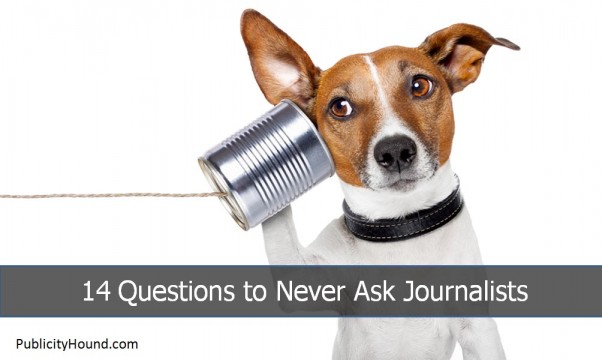
PR pro Michelle Garrett’s 7 Questions NOT to ask a reporter are a perfect checklist for anyone new to publicity, as well as to people who have been working with the media for awhile.
Reading them took me back to my days as a newspaper reporter and editor. And I immediately started thinking of other questions that otherwise well-meaning sources asked. Add these seven to Michelle’s list.
-
“If I tell you about a big news event we’re going to announce in two weeks, can you hold off printing it until …?”
No, we cannot. This is called an embargo. We hated embargoes 25 years ago when I worked in the newsroom. In today’s 24/7 news cycle, journalists hate them even more. If you’re making the same request to other journalists, there’s no guarantee anyone will honor it.
Last week, I wrote about circumstances in which news makers might ask to speak with a newspaper’s editorial board and brief them “on background” as a major news announcement is nearing. Agreements such as these are made by a newspaper’s editors, not by the reporters, columnists or feature writers.
-
“I’m a Certified Speaking Professional and a Certified Professional Organizer. Can you be sure to put the initials CSP and CPO after my name in your article?”
No. This is called “alphabet soup.” Most readers don’t know what CSP or CPO stands for. The letters will confuse them. If the titles are relevant to the topic, a journalist might include full titles within the article, particularly if you explain what certification means and why it’s important to people who do business with you.
How a person is identified on first and second reference is dictated by the Associated Press Style Book, widely used as a writing and editing reference in newsrooms, classrooms and corporate offices worldwide. The guide, organized like a dictionary, includes thousands of entries. Need an acronym for a government agency? Look under the agency’s name. Should you capitalize a word? Are certain forms of slang permitted in copy?
Anyone who writes materials for the media should invest $20.95 in this valuable guidebook. Don’t force journalists to clean up your style errors. Make their jobs easy.
-
Do you know when my press release will be printed?
This is usually the follow-up question to “Did you get my press release?”—one of the seven questions on Michelle Garrett’s list.
If you sent a release, assume they got it. If the news is that important, you should be pitching a story instead and offering a press release as back-up material. See The Pros and Cons of Press Releases vs. Pitches.
-
“Can you send me five copies of the magazine so we can have them for our files?”
This question sends the message, “I don’t respect your time, and I’m too cheap to buy them myself.”
Don’t bother journalists with this request. Call the magazine’s circulation department, order as many copies as you need, and expect to pay full price. Don’t wait until six months later or they might be gone.
-
“I stopped by because I was in the neighborhood. I’m in the lobby right now. Do you have time to come out and say hi?”
These were the people I wanted to strangle, especially when I was on deadline. Never barge in unannounced, unless it’s to give a reporter a major scoop.
Know the deadlines of the journalists, the publications and the broadcast outlets on your media list. If you aren’t sure, ask.
-
“Can you show me which photos of me you’re going to include with the story?”
This decision is made by the photographer and editors, not by the news sources. The last thing they need is you nixing their best photo because you don’t like the way you parted your hair.
-
“Can you send me digital copies of the photos you took of us? We’d like to print some for our own use.”
Photos are the property of the newspaper or magazine and they’re under no obligation to give them to you. Many newspapers and magazine have guidelines for reprinting or buying their materials at their websites. For example, here are the reprints and permissions guidelines from The Washington Post.
I only see seven questions. Where are the other seven? I hope one is “can I see the story before it’s published?”
Bob, click the link in the first paragraph. Those are her 7 questions. My 7 are in this blog post.
Thanks so much for sharing these, Joan!
Glad to help, Helen. I’ll be posting questions you can and should ask later today.
I am a current PR major; I really loved your Blog. I loved the question about having magazines sent out, I couldn’t agree more; it shouts out, “ I don’t want to pay for them!” I have heard so many of these quotes throughout my educational learning. I am wondering if when reporting, and having your editor put a hold on your story is it hard to wait for the release date to come when you start seeing the story popping up on other streams of social media?
Sara, if you’re referring to a journalist having their story put on hold, I can tell you that it’s frustrating when you get beat. But the truth is, the best stories don’t result from press releases. They result from people delivering a customized pitch to that media outlet. I recommend that you write a press release and post it online. You can then target, say, five media outlets and pitch a different angle to each of them, and offer the same press release. You might end up with three or four very different stories about the same topic. If you do, it’s time to celebrate! Thanks for stopping by.